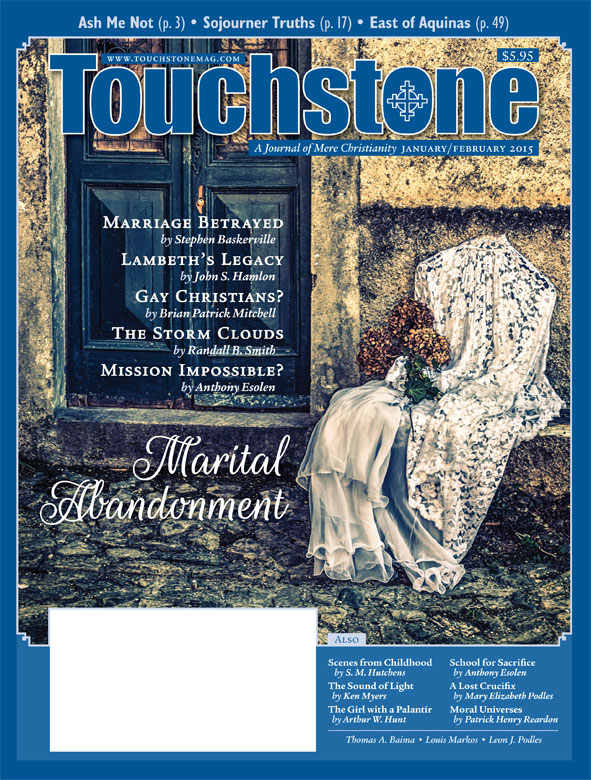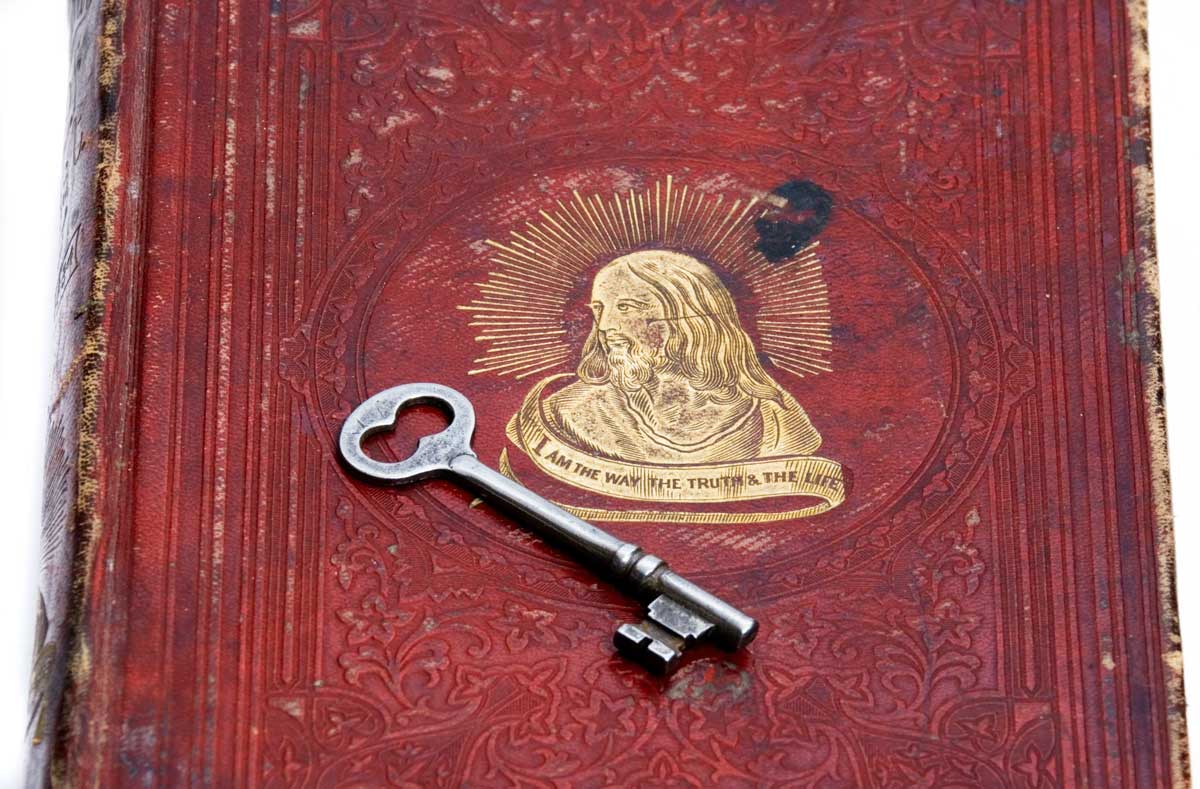View
Altered Matrimony
Stephen Baskerville on State Impositions
& Church Acquiescence
The marriage-tie, the marriage-bond . . . is the fundamental link in Christian society. Break it, and you will have to go back to the overwhelming dominance of the State. —D. H. Lawrence
It is clear to everyone now that Christians are losing the battle for marriage and with it the entire sexual revolution. Not only will same-sex marriage become the law of the land throughout the West, but measures mandating "equality," prohibiting "discrimination," and controlling religious expression will be further expanded and tightened, and institutions like the military will become not only secularized but increasingly sexualized and feminized. In The American Conservative, Rod Dreher openly questions whether Western Christianity itself can survive the revolution in sex. In the Daily Telegraph, the former archbishop of Canterbury issues similar warnings. No one has answered them.
Conservative polemicists on marriage are reduced to platitudes: "one man and one woman," "a public institution," and similar bromides that substitute soundbites for logical thought that leads to constructive responses. So despairing have Christians become that some now advocate abandoning reasoned argument in favor of appeals to "emotion."
As a social institution, our faith has become an empty shell, and it is entirely because of the new demands over sex.
Materially, some have plausibly traced the origins to the advent of birth control. But politically, there can be no doubt that the watershed moment was the abject failure of the churches to resist government-imposed ("no-fault") divorce. That was where we lost (more accurately, abdicated) the fight for marriage, and with it the battle for the souls of the next generation. In the showdown that never took place over sexual morality and the supervision of private family life, that was the moment the two jurisdictions were forced into a direct confrontation and the state simply and decisively told the church who is boss.
From the moment that the church failed to inform the state that it could not simply countermand God's covenant governing the family, the church has been little more than an ornament in marriage and therefore in the lives of most people.

The Guardian of Private Life
The standard conservative soundbite is that marriage is a "public institution," meaning that it confers public benefits and we therefore all have a stake in its integrity. But it is not quite so easy. Indeed, this cliché has done more harm than good, for it has rationalized the state's hegemony over marriage (including the power to define and re-define it) and with it, its hegemony over the church and the rest of society.
It is more accurate to say that marriage mediates the interface between public and private and is therefore the guardian of private life against a potentially totalizing state. The state cannot be denied all involvement in marriage (as libertarians advocate), because marriage must be recognized by the state, but precisely because—and this paradox is critical—it creates a sphere of privacy and parental authority from which the state must then withdraw or be excluded. Because no government can be counted upon to exercise this restraint voluntarily, all citizens must constantly demand that it do so. Marriage—protected by both a sacred covenant and a legally enforceable contract—gives us the legal authority and the moral high ground from which to do so.
Marriage is therefore today's most critical interface between the church and the state. Whoso controls marriage governs society, not least because it becomes "the hand that rocks the cradle."
This rivalry is not apparent in the terms by which marriage is contracted and consecrated. Here church and state can cooperate quite effortlessly: a ceremony, a signature. This is why the full implications of the state's assumption of effective monopoly control over marriage from the church were largely undetected or at least uncontested, literally, for centuries.
The Unfought Battle
Where the power struggle ensues is in the terms by which a marriage can be dissolved, and it was the divorce revolution that precipitated the battle that the church refused to fight. Here is where the churches ceded to the state the authority to dissolve marriages on its own terms and at its own pleasure and to erect a regime of governmental micromanagement over the private lives of the contracted parties (innocent as well as guilty ones)—all without any scrutiny or objection by the churches which consecrated the supposedly sacred union.
The result is that today the churches are parties to a fraudulent contract. They have transformed their office into an elaborate bait-and-switch in which they lure unsuspecting spouses into a supposedly binding and lifelong union—indeed, an ostensibly sacred "covenant," that is witnessed by the community and by God. State functionaries may then come along and—for any reason or no reason—simply tear up the covenant. And we should not mince words of casuistry here: the state does not merely tear up the secular contract while leaving the sacred covenant intact; the state tears up the covenant between the spouses, between the couple and the congregation, and between all the parties and God. The state's edict countermands the church's covenant and with it the church's entire authority, because it destroys a covenant that is perfectly valid in the eyes of God. With the church's acquiescence, state officials put God in his place.
(Regardless of theology, the state's increasing sovereignty over marriage since about the sixteenth century eclipses the authority of all churches, as it does of all families, and forces them all into legal contortions to rationalize their loss of any meaningful say in marriage. The Catholic doctrine of indissoluble sacramental marriage makes little difference in practice because, similar to secular law, the Church's annulment provision is not designed to distinguish between guilty and innocent spouses. As the recent proposal by Cardinal Walter Kasper demonstrates, it can prevent Communion and remarriage with its blessing by persons whose marriages have not been formally annulled. But it cannot protect an innocent spouse from the ravages of divorce, and it makes no effort to do so.)
For what will the church do in response to the state's assertion of supremacy over God's institution? Nothing.
The state can do all this in the absence of any legal transgression ("no-fault") on the part of one spouse (or even both) and it can impose its own terms on legally unimpeachable spouses and their children, and the church—which supposedly speaks for morality, justice, and God—will do . . . nothing. The state can then (and very likely will) drive the legally innocent spouse out of his home, permanently separate him from his children, seize his goods, and even jail him without trial, and the church—which speaks for morality, justice, and God—will again do . . . nothing. At best, the church will offer prayers and perhaps assistance in finding a lawyer.
The Churches' Rightful Authority
You ask, what can the church do? Actually, quite a lot. A church that refuses to enforce its discipline is not a true church, and when it comes to marriage, no church in the Western world, to my knowledge, enforces its discipline. Yet the churches could stop all of this.
The church has a proprietary interest in the marriages it consecrates and witnesses. It has a sacred obligation to guarantee the integrity of God's institution generally and of each marriage in particular. By refusing to take a stand against the forcible dissolution of marriages and families, the church emasculates itself. By refusing to judge disputes between its members (out of fear of being "judgmental," no less), which the Bible explicitly commands, the church has simply marginalized itself and surrendered its authority to the state.
This is the heart of the church's malaise today, not only regarding marriage, but regarding its entire authority in the eyes of the world. More than any other life event, marriage is where people look to the church to be more than nice words and abstract principles and depend upon its authority and integrity in their daily lives. And this is precisely where the churches have not simply failed, but made no effort.
In family disputes, the church must insist upon its authority as the first line of adjudication. Whenever a threat of government action against a family appears—not only a divorce, but also a child removal, a termination of parental rights, or any other action where the state is called in or threatens to enter the family and impose its coercive power and sanctions against family members who are not criminals—the church must act first. It must ascertain the facts and decide where justice lies. Whether the dispute arises from a member of the family or from a party external to it, such as state officials acting unilaterally, the principle is the same. (And indeed, this service could be offered to non-members, who of course often seek the church's services to solemnize their unions, presenting a perfect opportunity to demonstrate that the church offers something more substantial and enduring than a pretty setting for the occasion.) The church must speak for God and for justice. If the disputants refuse to abide by the church's decision and instead initiate legal action, the church must follow them to the secular courts as advocates, not for any particular party, but for justice.
Each congregation must act like a miniature version of the Homeschool Legal Defense Association, the -organization that defends parents from government interference in their education choices. When (and only when) the churches are willing to defend individual families against state functionaries, families will be more secure and the churches will be seen as something more than quaint registry offices.
A Vacuum Filled by Functionaries
The fear and failure of the churches to fulfill this responsibility have not left the family and divorce to the private realm and removed them from the public square, as the current wisdom would have it. On the contrary, they have left a vacuum that has been filled by state functionaries: lawyers, judges, social workers, forensic psychotherapists, police. It is hardly surprising that the gendarmes—and the rest of us—can simply ignore the church and push it aside on marriage and every other matter.
For the state puts no stock in the integrity of marriage. The married family is the greatest check on its monopoly of coercive force. "Every new marriage of man and woman," Allan Carlson told the World Congress of Families in 2004, "is also an act of defiance against ambitious political and ideological powers that would reduce human activity to their purposes." But this act is only effective if it is supported by the rest of us, organized in the sacred institution that is charged by God to serve as the guarantor of the union. Abdicating that responsibility to state officials is posting the foxes to guard the henhouse.
You may reply that the church has no time or resources for this. But the church is the entire congregation, and this is a responsibility none of us can afford to ignore. We are charged to watch over and admonish our brothers and sisters. Today's most faithful churches—the ones pulling out of the mainstream denominations because of homosexual ordination and same-sex marriage—find themselves spending millions on legal fees to retain their property for the sake of a gesture of questionable efficacy.
So long as the churches acquiesce in this debasement of marriage, it is hardly surprising that scavengers move in to pick over the carcass. "Commentators miss the point when they oppose homosexual marriage on the grounds that it 'would undermine traditional understandings of marriage,'" writes Bryce Christensen in The Family in America (April 2004). "It is only because traditional understandings of marriage have already been severely undermined that homosexuals are now laying claim to it." Same-sex marriage advocates openly acknowledge this. Though gay activists cite their very desire to marry as evidence that their lifestyle is not inherently promiscuous, they also acknowledge that that desire arises only by the promiscuity permitted in modern marriage. Stephanie Coontz observes that gays are attracted to marriage only in the form adulterated by heterosexual divorce: "Gays and lesbians simply looked at the revolution heterosexuals had wrought and noticed that, with its new norms, marriage could work for them, too" (The New York Times, July 5, 2005).
Covenants Betrayed
As cover for this failure to protect marriage where it falls under their own jurisdiction, the churches have forayed into two quasi-secular activities that, while not necessarily improper in themselves, have yielded dismal results as far as preserving marriage goes: political lobbying by paid professionals and ever-more elaborate psychotherapy for prospective spouses. These methods have lulled the congregations into the illusion that they can be passive.
Lobbying against same-sex marriage is now a losing battle, and trying to repeal no-fault divorce is, in itself, a non-starter. Meanwhile, in a futile effort to address the problem, churches demand that aspiring spouses jump through ever more elaborate marriage-preparation hoops that have little efficacy and serve only to place additional hurdles in their path. At worst, they seem to be based on the defeatist principle that strengthening marriage means discouraging people from entering it.
Albert Mohler has called this willing blindness on divorce "the scandal of the evangelical conscience." And of course, God will not suffer his institution to be mocked. Every social pathology today, from violent crime to substance abuse to truancy, is directly correlated to family breakdown and fatherless children. This anomie, like the welfare state that breeds it, is responsible for most of the domestic spending that is now bankrupting the Western democracies and expanding government power still further over the family, church, and the rest of civil society.
Historically in the Anglosphere, the family was the training ground for citizenship, and proceeding from that, so was the discipline of the church. The Puritans of England and New England called the family "a little commonwealth," and their biblically grounded congregations served as an alternative polity, both ecclesiastical and civil, that was at the heart of the Puritan grievance against not only the Church of England but also the English government itself; it served as the model for democracy. Betraying God's marriage covenant is leading us to betray the covenants that founded our civilization. •
Stephen Baskerville is Associate Professor of Government at Patrick Henry College and the author of Taken into Custody: The War Against Fathers, Marriage, and the Family (Cumberland House, 2007).
subscription options
Order
Print/Online Subscription

Get six issues (one year) of Touchstone PLUS full online access including pdf downloads for only $39.95. That's only $3.34 per month!
Order
Online Only
Subscription

Get a one-year full-access subscription to the Touchstone online archives for only $19.95. That's only $1.66 per month!
bulk subscriptions
Order Touchstone subscriptions in bulk and save $10 per sub! Each subscription includes 6 issues of Touchstone plus full online access to touchstonemag.com—including archives, videos, and pdf downloads of recent issues for only $29.95 each! Great for churches or study groups.
Transactions will be processed on a secure server.
more on marriage from the online archives
more from the online archives

15.6—July/August 2002
Things Hidden Since the Beginning of the World
The Shape of Divine Providence & Human History by James Hitchcock
calling all readers
Please Donate
"There are magazines worth reading but few worth saving . . . Touchstone is just such a magazine."
—Alice von Hildebrand
"Here we do not concede one square millimeter of territory to falsehood, folly, contemporary sentimentality, or fashion. We speak the truth, and let God be our judge. . . . Touchstone is the one committedly Christian conservative journal."
—Anthony Esolen, Touchstone senior editor













